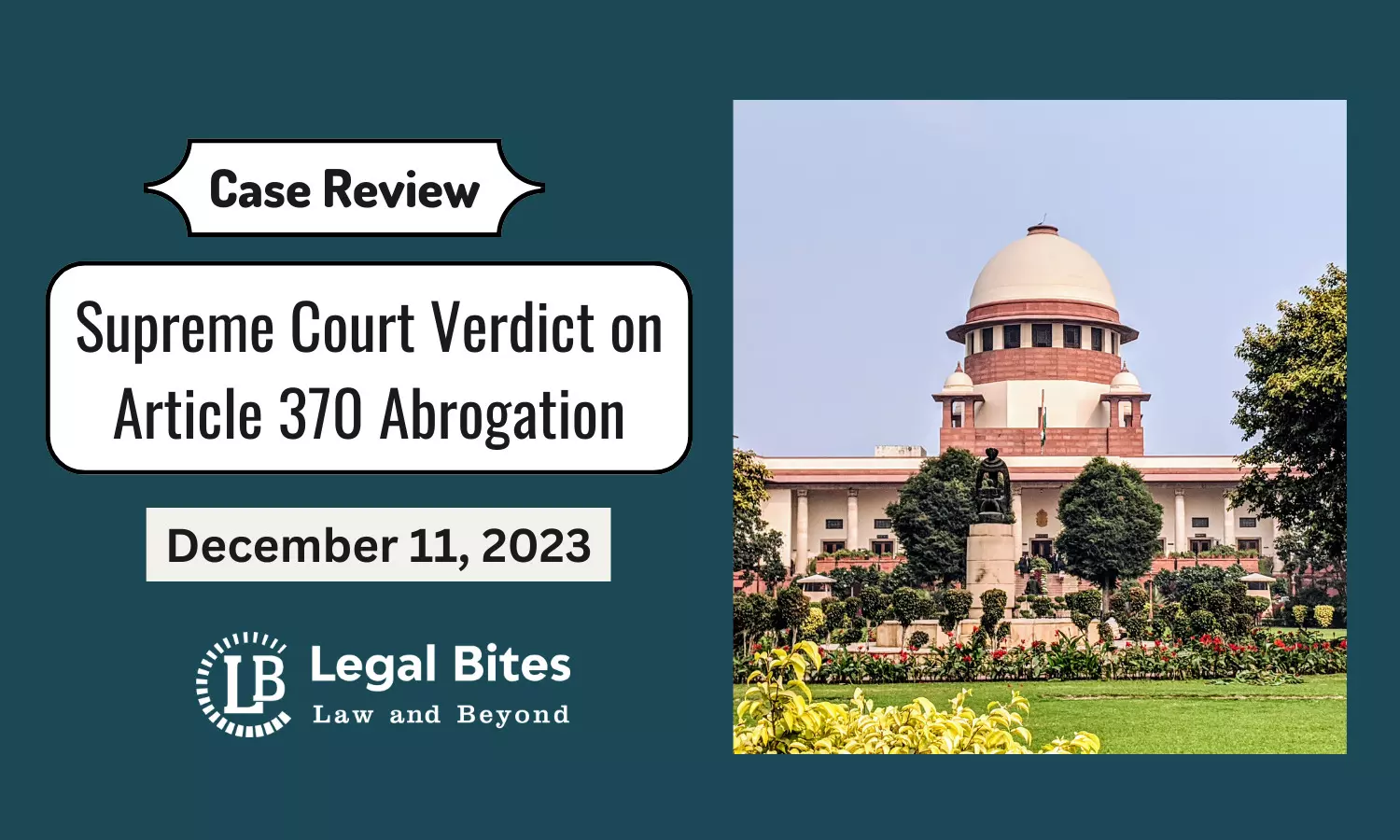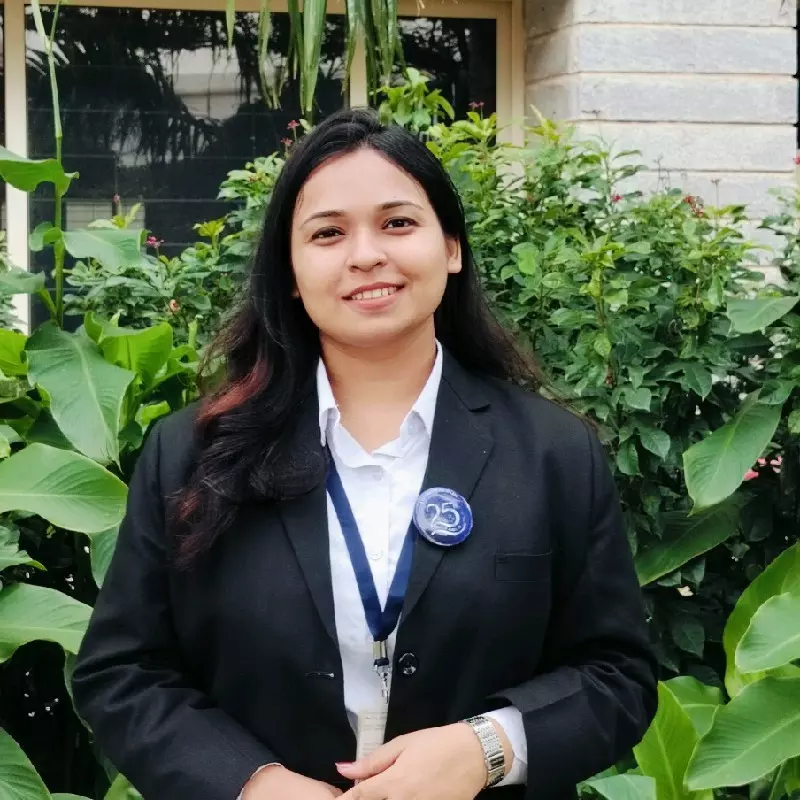Case Review: Supreme Court Verdict on Article 370 Abrogation
The Supreme Court's verdict on December 11, 2023, upheld the Centre's decision to abrogate Article 370 of the Constitution

The Hon'ble Supreme Court's verdict on December 11, 2023, upheld the Centre's decision to abrogate Article 370 of the Constitution, which conferred special status on the erstwhile state of Jammu and Kashmir.
In Re.: Article 370 of the Constitution
Citation: Writ Petition (Civil) No. 1099 of 2019
Judges: CJI DY Chandrachud, Justice Sanjay Kishan Kaul, Justice Sanjiv Khanna, Justice Bhushan R Gavai and Justice Surya Kant
Judgement: December 11, 2023
Click Here to Take a Closer Look at the Impact of the Scrapping of Article 370
Introduction to Article 370
In 1947, the former ruler of Jammu & Kashmir, Maharaja Hari Singh signed the ‘Instrument of Accession’ and further Article 370 was the result of this Instrument. By this Instrument, Singh asserted the J&K to be part of India but restricted India’s power to adjudicate the matters of Defence, External Affairs and Communications of J&K. Article 370 comprises of conditions stated in the Instrument of Accession. Its main objective was to ease the conversion of J&K from a sovereign princely state to a democratic entity under the 'Dominion of India.'
Under Article 370 of the Indian Constitution, J&K was approved of a special constitutional status which distinguishes it from other states of India. The Article restricted the Parliament’s influence to legislate on J&K matters and conferred greater power to the state legislature of J&K.
The provision ensured that the residents of J&K have absolute sovereignty, and all laws which are to be brought in should align with the resident’s consent.
Article 370 Enumerated Three Foremost Ingredients:
- India cannot legislate in J&K, except for 3 subjects which were stated in the Instrument of Accession. Apart from these, Parliament could pass laws only with the harmony of the J&K’s Constituent Assembly.
- Except Article 1 which states India as a ‘Union of States’ and Article 370 of the Indian Constitution, other provisions enshrined in the Indian Constitution were inapplicable to J&K and Article 370. The President of India possessed the authority to apply the provisions of the Indian Constitution to J&K by way of an executive order, guaranteeing that the Constitution of J&K was not disturbed and remained protected from the direct effects of the Indian Parliament.
- Unless recommended by the Constituent Assembly of J&K, Article 370(3) states that the Special status of J&K could not be amended/ repealed in any case.
Background of Article 370 Abrogation
On 5th August 2019, the Central Government remarkably revoked Articles 370 & Article 35-A of the Indian Constitution.
Subsequently, the Parliament passed the Jammu and Kashmir (Reorganization) Act of 2019, which highlights the reorganization of the State of J&K and separated the State into 2 Union Territories —
- J&K with a legislature and
- Ladakh, without legislature
Subsequently, after the President’s declaration, all the provisos of Article 370 ceased to be effective except:
“All provisions of this Constitution, as amended from time to time, without any modifications or exceptions, shall apply to the State of Jammu and Kashmir notwithstanding anything contrary contained in Article 152 or Article 308 or any other article of this Constitution or any other provision of the Constitution of Jammu and Kashmir or any law, document, judgement, ordinance, order, by-law, rule, regulation, notification, custom or usage having the force of law in the territory of India, or any other instrument, treaty or agreement as envisaged under Article 363 or otherwise.”
In simpler language the above para states that the State of J&K shall be subjected to all proviso of the Indian Constitution, as revised from time to time, without any alterations or exemptions.
- This will apply irrespective of anything contrary enshrined in Article 152, Article 308, or any of the other articles of the Indian Constitution,
- or any proviso of the Constitution of J& K,
- or any law, text, decision, ordinance, order, by-law, rule, regulation, notification, custom, or usage enforceable under law in the territory of India.
- It will also apply regardless of any other instrument, treaty, or agreement as envisioned under Article 363 or else.
Before this substitution, Article 370 approved special status to the State of J&K and provided for interim provisions w.r.t the State of J&K by Instrument of Accession.
This abrogation of Article 370 led to the filing of several writ petitions before the Court against and reorganization of the State of J&K.
Earlier the Court refused to escalate the petitions that challenged the constitutional validity of the Centre's decision to abrogate Article 370 to a larger bench. But after more than 2 years, the Court finally heard the matter.
After listening to the 16-day-long hearing, the Bench reserved its verdict on 05/09/2023.
Major Issues Before the Court
- Whether Article 370 hold the status of a temporary provision?
- What is the effect of the dissolution of the Constituent Assembly and further the scope of powers under Article 370(3)?
- Whether J&K reserve an element of sovereignty when it joined the Union of India?
- Are there any limitations on the power of the President or the Parliament under Article 356?
- Whether the Proclamation issued Constitutionally Valid?
Arguments Before the Court
- Article 370 gained permanency status after the dissolution of the Constituent Assembly of J&K. Since the Assembly ceased to exist in 1957 and according to Article 370(3), the said Article can only be revoked on the recommendations made by the Constituent Assembly of J&K, therefore abrogation of the same is unlawful.
- The Petitioner contended that the repealing of Article 370 was executed indirectly by firstly revising Article 368 of the Indian Constitution and then replacing the words ‘Constituent Assembly’ with that of ‘Legislative Assembly’ of J&K. This was only done after the dissolution of the Constituent Assembly in 1957 and therefore this replacement amounts to the colourable exercise of power. And that the Legislative Assembly was not even in session when the abrogation of Article 370 took place, since J&K was under the President’s rule. Hence, this order was done at the suggestion of the Parliament and not the Legislative Assembly of J&K who were not empowered to do so.
- When the President issues a proclamation, suspending the former State Legislative Assembly of J&K, there are certain implied limitations on exercising Clause 3 of Article 370, which states about the revocation of Article 370. A Legislative Assembly cannot be transformed into a Constituent Assembly for the reason that the intent of the Legislature can get biased, but this does not happen for the Constituent Assembly.
- Central government's powers under Article 3 cannot be used to alter a State into a Union Territory as done in the instant case of J&K. Any such alteration wr.t. to the State's boundaries should align with the state.
- It further contended that if the Government of India retired to completely merge J&K into India, then such desire should have been executed through a merger agreement as it was executed with other princely States. As per the records, there was no execution of such a merger agreement and therefore J&K got constitutional independence. The Muslim majority population of J&K had decided to be with India through the Constitutional promise of Article 370 of the Indian Constitution.
Key Takeaways from the Supreme Court's Verdict
A 5-judge Constitution bench, which was headed by Chief Justice of India, DY Chandrachud, gave its verdict on December 11, 2023. The bench also included Justice S K Kaul, Justice Sanjeev Khanna, Justice B R Gavai and Justice Surya Kant.
- Chief Justice of India, D Y Chandrachud stated that the 5-judge bench gave three unanimous judgments on this matter.
- The Chief Justice highlighted that challenging every verdict passed by the Union on behalf of the State could be the main reason for chaos, and vagueness, and further, the administration could be brought to a halt status.
- The Chief Justice also stated that J&K do not hold internal sovereignty different from other states in the country.
- Furthermore, he added that the Constituent Assembly of J&K was never envisioned to be a permanent body.
- While reading the judgement, The Chief Justice stated that Article 370 was executed as an interim arrangement because of the war conditions in the State and is fundamentally provisional.
- Further, the Supreme Court did not accept the petitioner’s contention that the Union government cannot take irretrievable actions in the State in the Presidential rule.
- The Court also stated that J&K did not hold to internal sovereignty post acceding to India.
- J&K became an essential part of India, as highlighted by Articles 1 and 370 of the Indian Constitution.
- The Court acknowledged the President’s power to bring in a notification announcing that Article 370 of the Indian Constitution ceases to exist, even after the ending of the Constituent Assembly of J&K.
- The Supreme Court elucidated that Article 370 was intended for the constitutional integration of J&K with the Union, and not for disintegration.
- The Supreme Court further lined that the concurrence of the State government was not essential for the application of all provisions of the Constitution through Article 370(1)(d), validating the President of India's take on the concurrence of the Union government and allowed all provisos of the Indian constitution to be made applicable to J&K.
- The Court highlighted that the suggestions of the Constituent Assembly of J&K were never binding on the President of India.
- Further, the Chief Justice stated that the restoration of statehood in the Union Territory of J&K shall be expedited.
- The Supreme Court upheld the reorganization of Ladakh as a Union Territory.
Click Here to Read the Official Judgment

